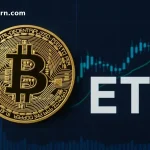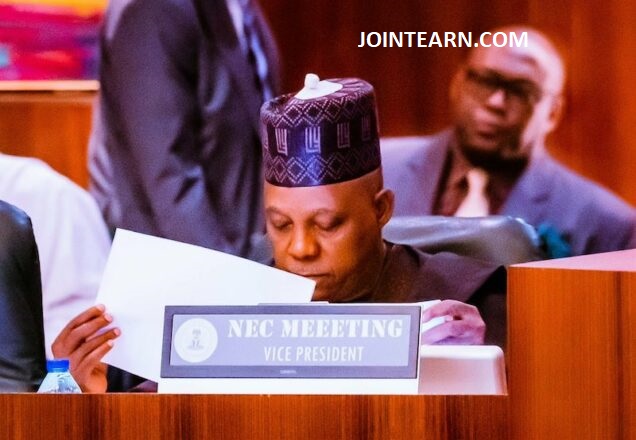Vice President Kashim Shettima on Thursday presided over the National Economic Council (NEC) meeting at the Presidential Villa in Abuja, where governors and other key stakeholders converged to deliberate on critical economic issues confronting the nation. The meeting, which came amid growing fiscal concerns and security challenges, was marked by a surprise appearance from the newly appointed Sole Administrator of Rivers State, sparking both curiosity and political intrigue.
The presence of the Rivers State Sole Administrator at the federal-level meeting—typically reserved for governors and their deputies—triggered quiet reactions among participants and observers, as political tensions in the oil-rich state continue to generate nationwide attention.
NEC Meeting Focuses on Economic Stability, Fiscal Reforms
The Vice President, in his opening remarks, reaffirmed the federal government’s commitment to economic stabilization and long-term reforms aimed at improving fiscal discipline, addressing inflation, and ensuring food security.
According to Shettima, the administration of President Bola Ahmed Tinubu remains focused on difficult but necessary decisions that will reposition the economy for sustainable growth. He cited key reforms such as subsidy removal, exchange rate unification, and the introduction of palliative measures to cushion the effects on the vulnerable population.
“While the path we have chosen is challenging, it is the most responsible and viable course for securing Nigeria’s economic future,” Shettima told council members. “The National Economic Council must remain a strong pillar of coordination between the federal and subnational governments.”
Rivers State Controversy Takes Center Stage
The unexpected appearance of the Sole Administrator representing Rivers State added an air of tension to an otherwise policy-focused session. In recent weeks, Rivers State has been at the center of a political storm following the controversial appointment of an interim administrator amid ongoing legal and political battles over the status of the elected governor.
The move to install a sole administrator has been condemned by critics as unconstitutional, with some labeling it a “democratic backslide.” However, supporters of the decision insist it is a temporary measure to maintain governance and avoid a power vacuum while the legal disputes are being resolved.
Although the NEC Secretariat has not formally explained the circumstances surrounding the administrator’s participation, sources indicate that the decision to allow attendance was based on legal advice provided to the Council Secretariat.
The identity of the administrator was not made public in the official communiqué, but their presence did not go unnoticed, especially among governors who had previously expressed concerns about undermining the federal principle of elected representation.
State Governors React Quietly
Most governors at the meeting refrained from publicly commenting on the presence of the sole administrator, choosing instead to focus on the economic agenda of the day. However, behind closed doors, murmurs of disapproval were reportedly shared, with several governors viewing the development as a potential precedent with far-reaching implications.
One source close to the NEC proceedings said, “The governors are cautious about saying too much publicly, but there is genuine concern about what this could mean for democracy at the state level. If administrators can suddenly attend NEC meetings in place of elected governors, it sends the wrong signal.”
The source added that while no formal protest was made during the session, some governors have resolved to raise the matter through appropriate legal and political channels in the coming days.
Key Economic Discussions and Resolutions
Beyond the Rivers controversy, the NEC meeting addressed a range of economic issues affecting the federation. One of the major highlights was the presentation by the Minister of Finance, Wale Edun, who provided an update on the state of government revenue, debt servicing, and plans to ramp up capital expenditure to stimulate the economy.
The Council also received briefings on food security challenges, the performance of state-level agricultural interventions, and updates from the National Bureau of Statistics (NBS) regarding inflation and unemployment rates.
To combat the rising cost of living, the NEC resolved to strengthen federal-state collaboration on targeted interventions, including the distribution of food aid, investment in mechanized agriculture, and youth-focused employment schemes.
The meeting also revisited plans for state police and community policing, with a renewed push for constitutional amendments to empower state governments to address local security challenges more effectively.
Shettima Calls for Unity, Patience
Concluding the meeting, Vice President Shettima appealed to all NEC members to remain united and committed to the collective goal of national development. He acknowledged the current hardship experienced by Nigerians and stressed that both federal and state governments must work together to implement sustainable solutions.
“The people are looking to us for leadership, empathy, and action. We must not fail them,” he said. “Our commitment must transcend politics and focus on what is best for the nation.”
He also urged council members to resist distractions and remain focused on long-term development goals, adding that Nigerians would ultimately judge leaders based on results, not rhetoric.
Political Undertones Persist
Although the economic agenda dominated the NEC meeting, the underlying political tensions—especially with the Rivers State situation—served as a reminder of the broader challenges confronting Nigeria’s federal system.
Analysts warn that unless properly addressed, the precedent of non-elected officials representing states in federal decision-making platforms could erode confidence in democratic processes and deepen political divisions.
As the dust settles from this latest NEC session, attention will likely shift back to the unfolding situation in Rivers State and the national conversation it has sparked about governance, legality, and political accountability.











